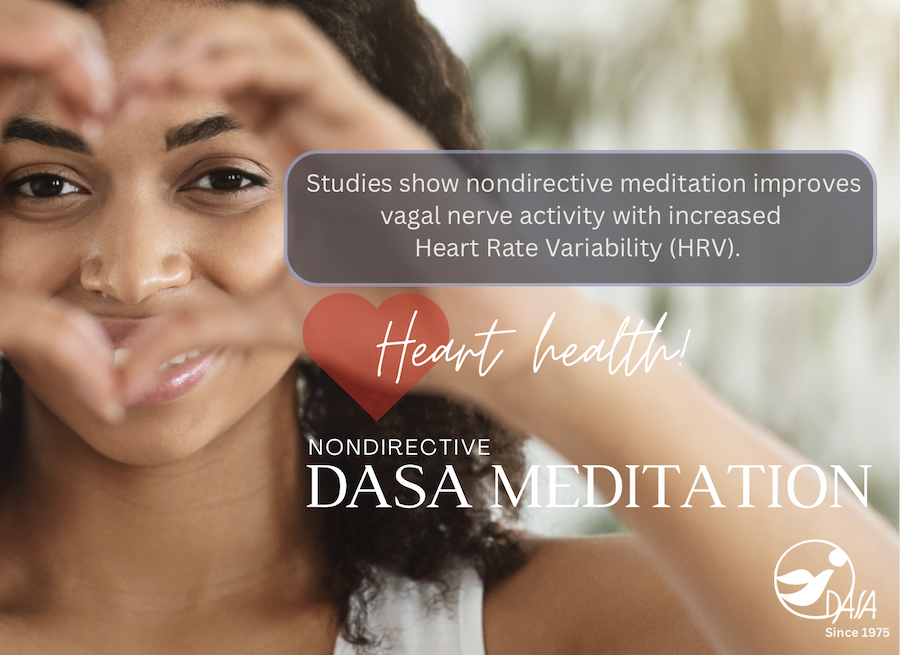By Lorraine Alexander
NONDIRECTIVE MEDITATION IMPROVES HEART HEALTH ❤️
Here's a great point of interest for this month's topic. Did you know that nondirective meditation benefits heart health in multiple ways? We share five fascinating medical studies that you won't want to miss!
Improve heart rate variability (HRV). Medical studies show nondirective meditation improves vagal nerve activity with increased Heart Rate Variability (HRV). Good HRV means a longer span between steady heartbeats and recovery with greater ease.
Improve vagal tone. The vagus nerve is the 10th cranial nerve, the longest nerve of the human body. It is responsible for our heart, lungs, and digestion. This system has two branches: the sympathetic response responsible for "fight or flight," and the parasympathetic response responsible for "rest and digestion." Nondirective meditation engages the vagus nerve and the parasympathetic relaxation response, at the same time, the sympathetic stress response lessens.
Avoid sleep deprivation. Another interesting study demonstrates that a single night of sleep deprivation increases sympathetic (fight or flight) cardiovascular modulation. When we practice nondirective meditation daily, accumulated stress dissolves naturally offering optimal sleep and restoration for the brain and body. Learn tips for ideal sleep hygiene.
Seven key benefits of nondirective meditation:
- Improves Heart Rate Variability (HRV) with good vagal tone and cardiovascular response.
- Reduced risk of hypertension (high blood pressure).
- Facilitates stress reduction.
- Improves emotional balance through healthy processing of emotions. Emotional calm, stability, and balance means less stress; this may directly or indirectly aid in heart health.
- Growth in the brain region known as the prefrontal cortex (the memory and learning center).
- At the same time, the brain's amygdala (fear center) activation is reduced. Both are documented through imaging.
- The brain's alpha power increases significantly during meditation.
Through daily practice we may enjoy increased longevity, improve health, and gain a higher quality of life.
- Nondirective meditation increases heart rate variability (HRV): https://pubmed.ncbi.nlm.nih.gov/21693507/
- Nondirective meditation activates memory/emotional processing. Comparison of various methods: https://www.ncbi.nlm.nih.gov/pmc/articles/PMC3935386/
- Nondirective meditation facilitates stress reduction: https://pubmed.ncbi.nlm.nih.gov/33584485/
- Nondirective meditation increased brain theta/alpha/EEG results: https://pubmed.ncbi.nlm.nih.gov/19922249/
- Sleep deprivation affects cardiac autonomic control and inflammation:https://pubmed.ncbi.nlm.nih.gov/23601527/
- Exercise and make healthy food choices. These are essential for your health.
- Practice a deep and rejuvenating form of nondirective meditation as a baseline twice daily.
- Bring additional relaxation techniques and nature into each day.
- Optimize sleep hygiene. Sleep is a time of restoration and elimination of toxins for both the brain and body.
- Last but not least, be socially active, have fun, live long in health.
#nondirectivemeditation #hearthealth #relaxation #calm #balance #dasameditation #equanimity
Certified DASA instructors teach in the United States, Canada, and Japan.
Contact DASA Meditation to learn more.
🌿 Receive monthly news.
Linked-in / Facebook
| ABOUT Lorraine first learned to meditate at the young age of 15. Her work includes publication in the Bohemian, NorthBay Biz, the US Green Building Council, the Windsor Times, Homes & Lifestyles, and the Press Democrat. Additionally, she is the primary contributor to the DASA Meditation blog. She teaches DASA Meditation in Northern California. Contact [email protected] Connect on Linked-in |






 RSS Feed
RSS Feed

